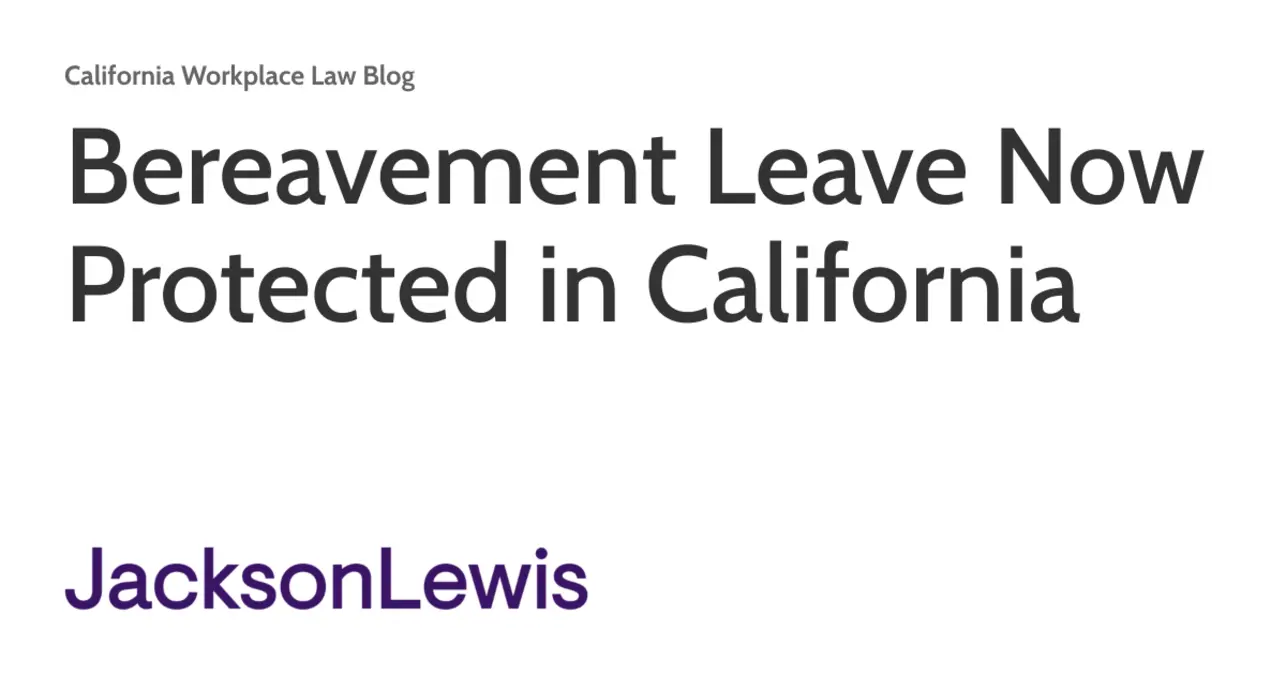Grieving the loss of a loved one is a deeply personal experience, and during such a difficult time, the last thing anyone wants to worry about is work. Bereavement Leave in California is the time off granted to employees when they lose a close family member, allowing them to grieve and handle the practical aspects of death, such as attending funerals or managing legal affairs. But what exactly does bereavement leave look like in California? How much time are you entitled to, and what are the specifics? Let’s break it down.
Understanding Bereavement Leave in California
Bereavement Leave in California is essential to workplace benefits in California, though it’s less widely discussed than other forms, such as sick or vacation time. In California, bereavement leave policies can vary significantly from one employer to another, as there isn’t a state-mandated law that applies universally across all workplaces.
The Legal Landscape
California has no specific statewide law mandating bereavement Leave in California for all employees. This means that the provision of Bereavement Leave in California is typically left to the discretion of individual employers. Some businesses may offer paid bereavement leave, while others may provide unpaid time off. The amount of time granted can also vary, ranging from a few days to several weeks, depending on the company’s policy.
However, the California Legislature has been discussing implementing a wide-statewide bereavement leave law. While these discussions indicate a growing awareness of the importance of such leave, concrete legislation has yet to be passed.
What Employers Typically Offer
Many employers in California recognize the need for Bereavement Leave in California and offer some form of it as part of their benefits package. Typically, bereavement leave policies provide between three and five days of paid leave for the death of an immediate family member. This may include parents, spouses, children, or siblings. Employers may extend this to include grandparents, in-laws, or other relatives.
It’s worth noting that while these policies are common, they are not standardized, so it’s important to check your specific employer’s policy to understand your rights and entitlements.
How to Request Bereavement Leave

Navigating the process of requesting Bereavement Leave in California can feel daunting, especially when you’re dealing with the emotional aftermath of a loss. Here’s a straightforward guide to help you through the process.
Notifying Your Employer
The first step in requesting Bereavement Leave in California is to notify your employer immediately. Depending on your workplace culture and the situation’s urgency, this can be done through an email, a phone call, or in person. It’s important to communicate the reason for your leave and provide any necessary details, such as the relationship to the deceased and the expected duration of your absence.
Employers are often understanding and will accommodate your need for time off, but providing as much notice as possible helps them arrange to cover your duties while you’re away.
Documentation Requirements
Some employers may require documentation to grant Bereavement Leave in California. This could include a death certificate, an obituary, or a funeral program. While this can feel intrusive during such a sensitive time, it’s often a standard procedure to ensure that the leave is used appropriately.
If your employer requires documentation, it’s best to provide it promptly to avoid delays or complications with your leave.
Using Vacation or Sick Days
Some employees may use their vacation or sick days to cover their time off without a formal Bereavement Leave in California policy. While this could be better, it provides a way to ensure you still receive your regular pay during your absence. It’s a good idea to discuss this option with your employer if bereavement leave isn’t specifically covered under your company’s policies.
The Emotional and Practical Benefits of Bereavement Leave
Bereavement Leave in California is about more than just time off work; it’s a critical part of the healing process after the loss of a loved one. Understanding the emotional and practical benefits can help underscore why this type of leave is important.
Emotional Support
Grief is a complex and personal experience that affects everyone differently. Having the time and space to process your emotions without the added work pressure can be incredibly beneficial. Bereavement leave provides an opportunity to focus on self-care, whether by spending time with family, seeking counselling, or simply allowing yourself to mourn.
The support of an understanding employer during this time can significantly affect how employees cope with their loss. When employees feel supported, they are more likely to return to work, feeling more emotionally balanced and ready to resume their responsibilities.
Handling Practical Matters
The death of a loved one often comes with a host of practical responsibilities, from planning a funeral to settling the deceased’s affairs. Bereavement leave allows employees to manage these tasks without the added stress of work obligations. This time can be used to make necessary arrangements, attend services, and handle legal matters such as reading wills or managing estates.
Having the necessary time to address these issues helps ensure that everything is handled properly, which can provide a sense of closure and peace of mind during a difficult period.
The Future of Bereavement Leave in California
While California has yet to implement a wide-statewide bereavement leave law, the conversation around this issue continues to evolve. There is a growing recognition of the importance of providing employees with the time they need to grieve and manage the aftermath of a loss.
Potential Legislation
In recent years, several attempts have been madeseveral attempts have been made to pass legislation requiring employers in California to provide bereavement leave. Although these efforts have not resulted in a statewide law, they have sparked important discussions about employee rights and workplace policies.
If such legislation were to pass, it could provide a more uniform standard for bereavement leave across the state, ensuring that all employees have access to the time they need during such a challenging period.
Advocacy and Awareness
Advocacy groups continue to advocate for better bereavement leave policies at the state and national levels. By raising awareness of the importance of bereavement leave, these groups hope to encourage more employers to adopt supportive policies, even without a legal mandate.
As awareness grows, we will likely see more employers in California and beyond recognizing the value of bereavement leave and including it as a standard part of their benefits package.
Conclusion: Navigating Bereavement Leave in California
Bereavement leave is an essential but often overlooked benefit in the workplace. While California does not currently mandate bereavement leave for all employees, many employers offer it voluntarily as part of their benefits package. Understanding your rights and options regarding bereavement leave is crucial to ensuring that you can take the time you need to grieve and manage the practical aspects of losing a loved one.
If you’re unsure about your entitlements, reviewing your employer’s policies or speaking with your HR department is always a good idea. As discussions about potential legislation continue, there’s hope that bereavement leave will become a more standardized benefit, providing support for all employees during their times of need.





Your point of view caught my eye and was very interesting. Thanks. I have a question for you.
Thank you for your sharing. I am worried that I lack creative ideas. It is your article that makes me full of hope. Thank you. But, I have a question, can you help me?
Thank you for your sharing. I am worried that I lack creative ideas. It is your article that makes me full of hope. Thank you. But, I have a question, can you help me?